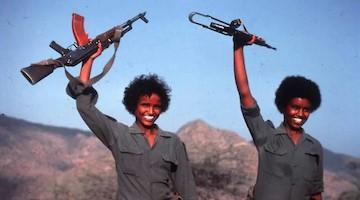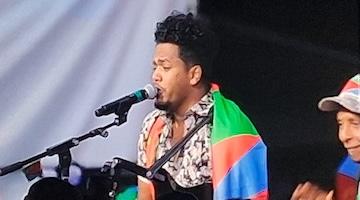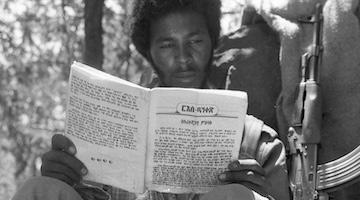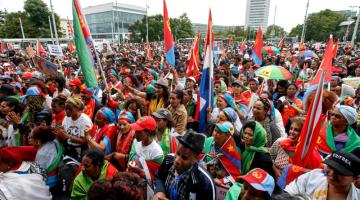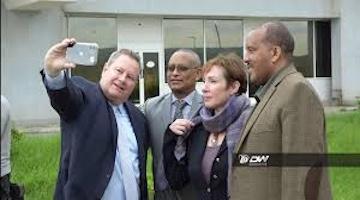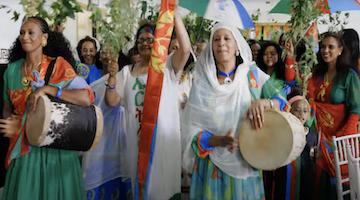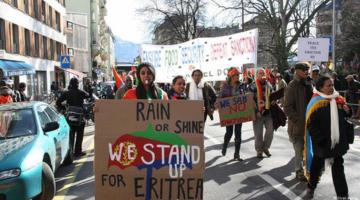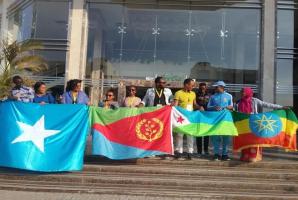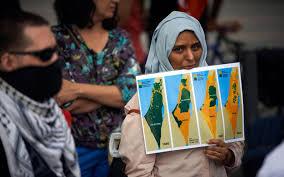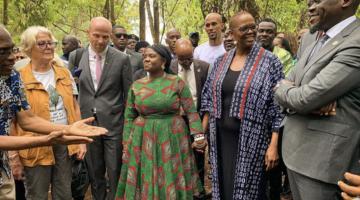Michel Collon has interviewed Eritrean President Isaias Afwerki and says the world must listen to him.
Michel Collon is a French investigative journalist and co-founder of the website Investig’Action. He believes that we must listen to Eritrean President Isaias Afwerki and that we mustn’t trust what Western media tell us about him. “When it presents a leader as a dangerous monster,” he writes, “shouldn’t we first ask ourselves why it is saying that?”
My Struggle for Eritrea and Africa is Collon’s extended interview with President Isaias.
Several passages stand out. In his introduction, Michel Collon writes:
“As soon as it was liberated, Eritrea was put under pressure by the World Bank: ‘We will write your economic programme. Otherwise. . .’”
Eritrea said no to the World Bank and the result was war: economic, political, military, migration, and media war. The West imposed sanctions, a neocolonial coalition isolated the country, the US organized a proxy war with Ethiopia from 1998 to 2000, the CIA did its best to drain the country of its youth, and fake news demonized the Eritrean government.
Eritrea resisted, and while other African nations concentrated wealth in the hands of elites and built skyscrapers conceived as “development,” it prioritized basic needs such as healthcare, education, equality, and harmony between populations and religions.
Much of what President Isaias has to say is about the importance of nation-building in order to overcome the ethnic and clan divisions that plague Africa. Anyone who has visited Eritrea’s neighbor Ethiopia knows how much it struggles with ethnic animosity and armed conflict. Right now both Amhara and Oromo ethnic militias are at war with their federal government.
President Isaias recounts the moment when former Ethiopian President Meles Zenawi presented him with a draft of his constitution based on the rights of nine ethnolinguistic states (Tigray; Afar; Amhara; Oromia; Somali; Benishangul Gumuz; Southern Nations, Nationalities, and People (SNNP); Gambella; and Harari):
“After an hour’s reading, I asked for another day to highlight and come back with my structured point of view. I read over and over again what he had given me: a draft Constitution for the Federal Democratic Republic of Ethiopia.”
He then told Meles that this constitution was not suitable for Ethiopia or for any country in Africa because it was based on ethnicity and it was going to be very dangerous, as it has been. Meles Zenawi’s government, a longtime US proxy in the Horn, heightened division by insisting that everyone’s ethnicity be stamped on their identification cards.
When I was in Ethiopia someone told me that upon applying for identification, he told authorities that one of his forebears was Jewish, one Amhara, another Oromo, but his father was Somali, so they said, “OK, we’re going to call you Somali” and stamped that on his identity card.
“The current situation in Ethiopia is the result of an ethnic conception,” President Isaias says. “It is a disaster!” Indeed, the country continues to be wracked by ethnic civil wars. He also discusses Somalia and Sudan’s struggles to rise above ethnic and clan competition.
“Each nation has its own situations that can be diagnosed and dealt with,” he says. “At the end of the day it’s all about ‘nation-building.’ Technically it’s very simple. You need roads, infrastructure, energy, water, housing, mines, and all sorts of economic structures.
“These are simple questions to ask. Before tackling these issues in depth, ask the question of nation-building. If you haven’t put in place the architecture needed for nation-building, you won’t be able to tackle secondary problems.”
Given the civil wars and threats of international wars in the Horn, it can be difficult to imagine an alliance for regional support between Eritrea, Ethiopia, Sudan, and Somalia, but President Isaias says, “We have no choice. We have a duty. We can solve our own national problems, but we must unite to create a regional environment. Because it makes no sense to separate things: everything depends on the collective.”
Eritrea facing interference of US imperialism
President Isaias describes his reaction when someone from the World Bank came to tell him he was going to write the country’s economic program.
“I remember the World Bank representative saying to me: ‘That’s the norm, that’s how it’s done everywhere. We write programmes for countries’. I replied, ‘I’m capable of writing my country’s program.’”
He also says, “Multinationals are involved in all development programmes. Africa is stripped of its resources and prevented from setting up sovereign institutions capable of meeting all the challenges.
“For me, economics is simple: production, distribution, and consumption. Or the creation and distribution of wealth. How do we apply this to every situation on a continental level? How do we create wealth? Wealth is production, and we need to get serious about that. At the moment, we live in a subsistence economy. We need to create wealth. And that doesn’t mean mining for gold or uranium, planting trees or growing food. It means increasing wealth by introducing technology.
“But you cannot do that if you’re paralysed, if someone else writes your programme and someone else comes and extracts everything from your house.”
He notes that there are 1.2 billion people on the African continent, that the population will double in the space of a generation, and that life will become even more difficult if it can’t be lifted out of the subsistence agriculture economy.
When I visited Eritrea in 2020 its agriculture minister shared the government’s “Minimum Household Agriculture Package” initiative to increase agricultural productivity and uplift the 60-70% of the population engaged in subsistence farming. Some families are given enough livestock, fruit, leguminous, and firewood trees, and arable land to make them capable of producing food for four families, making way for a more complex division of labor and economy.
President Isaias notes that the US is now more than 30 trillion dollars in debt and that most products are made in China. The US/EU/NATO, he says, are in panic mode, but he sees no change in Washington’s attitude. “Can you imagine anything more shameful than what they are doing in Gaza? It is an expression of the degradation of their moral and political position. . . “ Are these Western leaders still human beings?
He distinguishes, however, between North American and European people and their leaders and says North America still has a positive role to play and contributions to make.
Americans, he says, are those most held hostage by media propaganda. “The most disadvantaged people, like George Floyd, are not an exception among Black people.”
Michel Collon notes that Europe has followed the US into the Ukraine War like a puppy dog, and President Isaias responds that most North American and European citizens are not NATO, and Africans must not confuse them.
The challenges of Eritrea today
“Human resources,” President Isaias says, “determine the dynamics of any project, programme, or strategy. How can we obtain qualified or prepared human resources? Allocating as much of the budget as possible to education means taking the view that the decision to invest in this sector is not based on emotion or ideology, but on a realistic assessment of our needs in both the long and short term.”
After Eritrea won its independence, UN institutions gave it $50 million, despite disagreements, and it spent $50 million on education.
He says they have created complete maps with details of the country’s natural resources, including water and soil quality. They know exactly how they can best optimize production. President Isais discusses agriculture, soil, water, mineral, and fish reserves management in expansive and impressive detail.
When I visited Eritrea, its chief development strategist, Hagos Gebrehiwot, told me their motto is that not one drop of rain should fail to irrigate and not one drop should erode the soil.
President Isaias’s discussions of women, youth, migration, the diaspora, and the country’s controversial national service are fascinating. I’ve read them once and plan to read them again.
He says that no one has to grant Eritrean women their rights, that they’ve earned their place, demonstrated their skills, courage, and leadership in the independence struggle and the ongoing struggle to build the country.
“Talking to us about women’s rights or gender equality is a business for these [foreign] organizations. It’s part of their propaganda. In reality they use it to promote other programmes and objectives.”
I finished this book more impressed and intrigued than ever by the Eritrean project and president. It’s a densely meaningful but easily readable 75 pages, with an afterword by regional scholar Mohammed Hassan, who says he believes that President Isaias is “the most important living African leader” and that the world urgently needs to read this book now.
Ann Garrison is a Black Agenda Report Contributing Editor based in the San Francisco Bay Area. In 2014, she received the Victoire Ingabire Umuhoza Democracy and Peace Prize for her reporting on conflict in the African Great Lakes region. She can be reached at ann@anngarrison.com. You can help support her work on Patreon.

